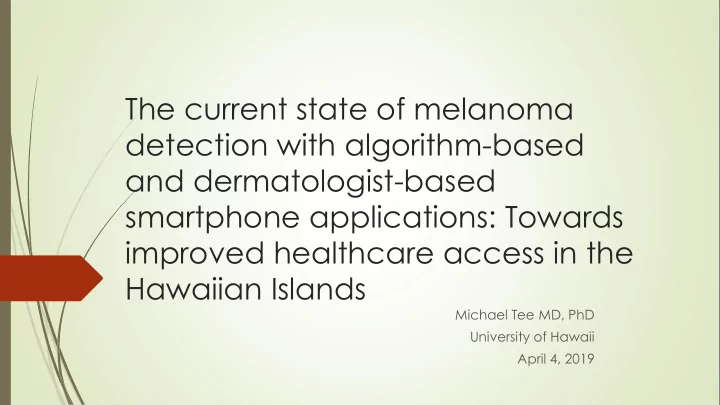

The current state of melanoma detection with algorithm-based and dermatologist-based smartphone applications: Towards improved healthcare access in the Hawaiian Islands Michael Tee MD, PhD University of Hawaii April 4, 2019
Disclosures No financial disclosures •
Outline • Skin cancer • Hawaiian Islands • Aim • Method • Results • Summary • Current state of implementation • Take home points
Introduction: Skin cancer 101 • 3 Main types: Basal, Squamous, Melanoma • the incidence of skin cancer (in Aus) is one of the highest in the world • two to three times the rates in Canada, the US and the UK • 5.4 million cases (US) NMSC , 959,243 (Aus) • 96,480 (US) new melanomas, 15,229 (Aus) • 7,230 people (US) die of melanoma, 1,725 (Aus) *SEER = Surveillance, Epidemiology, and End Results • Merkel cell cancer 2000 a year American Cancer Society https://melanoma.canceraustralia.gov.au/statistics
Hawaiian Islands
Hawaiian Islands Island, Population, Dermatologist, 2018 Oahu 943,207 20-40 Hawaii 186,738 2 Maui 144,444 4-5 Kauai 66,921 1 Molokai 7,345 none Lauai 3,135 none Niihau 170 none Kahoolawe (unpopulated) none
Aim: Access to dermatological expertise Hawaiian Islands • geography greatly encourages the use of virtual care • • Meaningfully embed virtual care into clinical care
Aim: Access to dermatological expertise Via smartphone applications • 43 dermatological apps related to melanoma detection in 2018 Teledermatology store-and-forward platforms • • Dermatologist-based (DB) mobile examination • Internal algorithm-based (AB) apps
Method • Meta-analysis to assess the association between melanoma detection and smartphone screening. • comprehensive literature review through December 2018. • case-control and cross-sectional studies that compared the detection abilities of melanomas with smartphones compared to face-to-face (FTF) dermatologist screening with histopathological diagnoses confirmation. • calculated pooled odds-ratio (OR) with 95% confidence intervals (CI) and I 2 statistics using a random effect model.
Results • Nine studies with sixteen smartphone apps Favors no melanoma detection Favors melanoma detection benefit compared to FTF benefit compared to FTF
Summary FTF examinations are still superior to both the current AB • and DB apps. As algorithms and processes improve, continued • scrutiny and transparency is needed.
Applications in the Hawaiian Island Little to no uptake •
Take Home Points Much work to be done before implementation in • Hawaii’s healthcare system • Quality verification issues • Reimbursement issue • Integration, usability Access issues continue to be an issue •
References 1.Ngoo, A., Finnane, A., McMeniman, E., Soyer, H. P. & Janda, M. Fighting Melanoma with Smartphones: A Snapshot of • Where We are a Decade after App Stores Opened Their Doors. Int. J. Med. Inf. 118 , 99 – 112 (2018). 2. Dorairaj, J. J., Healy, G. M., McInerney, A. & Hussey, A. J. Validation of a Melanoma Risk Assessment Smartphone • Application: Dermatol. Surg. 43 , 299 – 302 (2017). 3. Maier, T. et al. Accuracy of a smartphone application using fractal image analysis of pigmented moles compared to • clinical diagnosis and histological result. J. Eur. Acad. Dermatol. Venereol. 29 , 663 – 667 (2015). 4. Kroemer, S. et al. Mobile teledermatology for skin tumour screening: diagnostic accuracy of clinical and dermoscopic • image tele-evaluation using cellular phones: Mobile teledermatology for skin tumour surveillance. Br. J. Dermatol. 164 , 973 – 979 (2011). 5. Boyce, Z., Gilmore, S., Xu, C. & Soyer, H. P. The Remote Assessment of Melanocytic Skin Lesions: A Viable Alternative to • Face-to-Face Consultation. Dermatology 223 , 244 – 250 (2011). 6. Börve, A., Terstappen, K., Sandberg, C. & Paoli, J. Mobile teledermoscopy —there’s an app for that! Dermatol. Pract. • Concept. 3 , (2013). 7. Börve, A. et al. Smartphone Teledermoscopy Referrals: A Novel Process for Improved Triage of Skin Cancer Patients. Acta • Derm. Venereol. 95 , 186 – 190 (2015). 8. Wolf, J. A. et al. Diagnostic Inaccuracy of Smartphone Applications for Melanoma Detection. JAMA Dermatol. 149 , 422 • (2013). 9. Chadwick, X., Loescher, L. J., Janda, M. & Soyer, H. P. Mobile Medical Applications for Melanoma Risk Assessment: False • Assurance or Valuable Tool? in 2014 47th Hawaii International Conference on System Sciences 2675 – 2684 (IEEE, 2014). doi:10.1109/HICSS.2014.337 10. Ngoo, A. et al. Efficacy of smartphone applications in high-risk pigmented lesions. Australas. J. Dermatol. 59 , e175 – e182 • (2018).
Questions
Recommend
More recommend